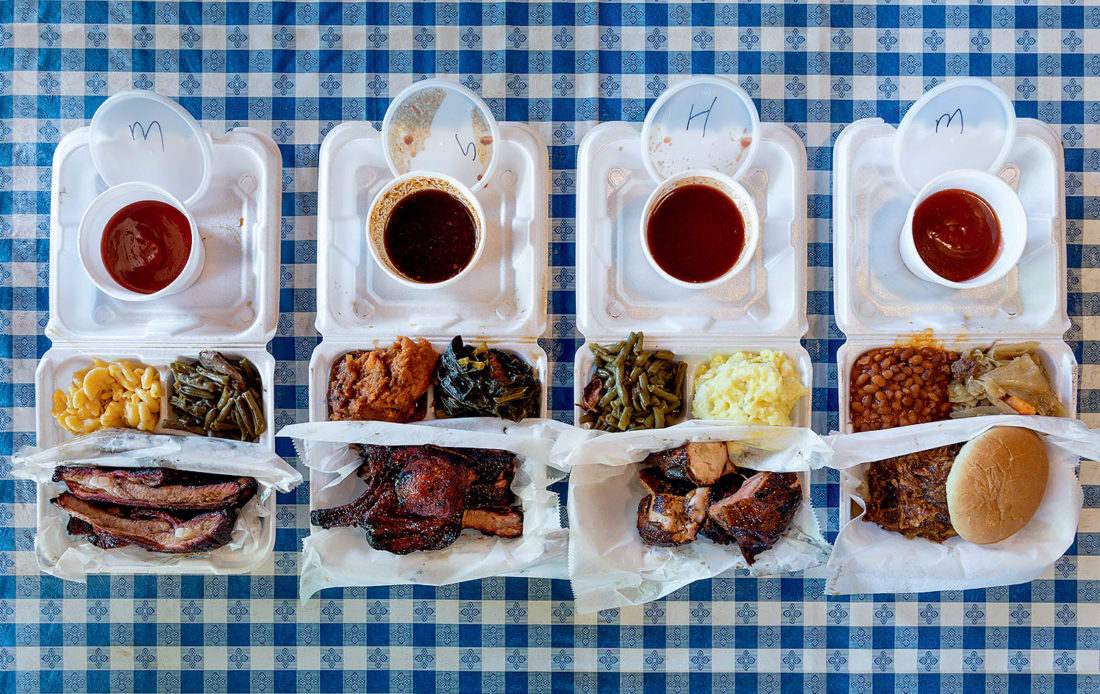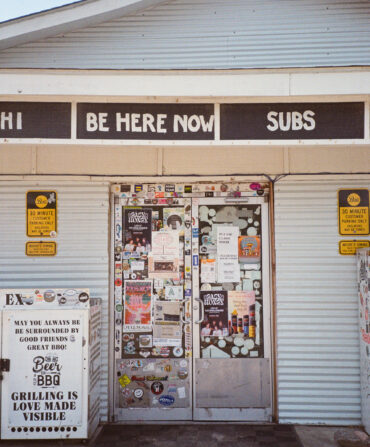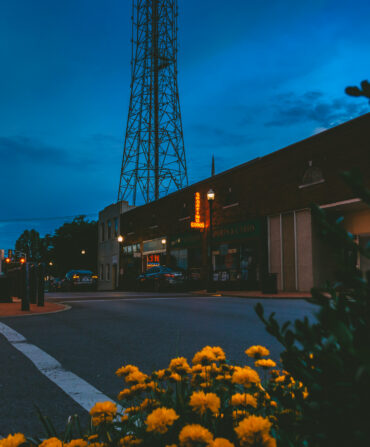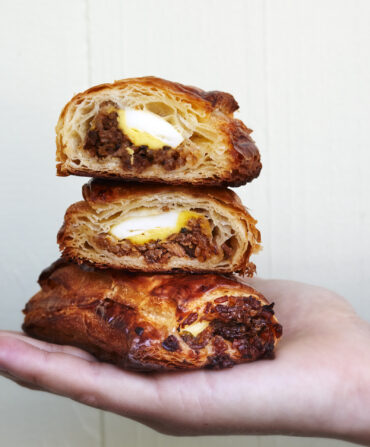We’d stop at the shack on the highway to pick up dinner once a week or so, usually after shopping at Super Fresh and swinging around to see if we recognized any trucks parked outside the VFW.
This was Charles County, where I grew up, a rarely discussed piece of Maryland south of Washington, D.C., down where the Potomac River cups the land like a hand around an apple. My family lived on a gravel road in the woods, ten miles from the closest grocery store. Wheels took us everywhere, and we didn’t waste time stepping out if we didn’t have to. Even the liquor stores had drive-
up windows.
Along Indian Head Highway, a giant sign of a cartoonish pig in a chef’s hat stood on top of a crumbling white building. This was George’s, our rib shack. It was a daily miracle that the walls and roof didn’t crash down. There were no seats. No drinks. Just a window with a sign that said they were open until the ribs ran out, which usually happened around 7:00 p.m. We’d order half slabs of pork ribs in Styrofoam trays to go, and cups of thick and tangy sauces for dipping, mild and hot, and I’d pinch my nose on the way home to
tame the torture of waiting.
Everybody in Charles County claimed at least one rib joint. To this day, if you take any road of consequence in the county, you’ll run into Randy’s or Johnny Boy’s or Dale’s. Old-timers remember Penny’s and Dutch’s and Murphy’s. They all had similar traits—sliding windows, hickory logs, messy smokers, and sanitation grades best ignored. Most of us remained loyal to the one closest to home.
Some families in our diverse little pocket of Maryland had it better than others, but black or white, our community was middle-class at best. My dad was a fisherman, my mother a schoolteacher. My friends’ parents worked government or union jobs. Others bounced around.
Southern Maryland’s ribs are kind of like that, too. They get along, right where they are, tender and tough and a little sloppy sometimes, but never precious. Far as I can tell from reading old cookbooks, they rose to prominence locally because most families are Catholic, and barbecue goes a long way. These rib shacks aren’t vying for medals and haven’t been the subjects of marketing campaigns, which instead steer the foodie mobs to the region’s crab houses.
“Watch out, Texas and Tennessee,” the Washington Post declared in 1986 in a rare instance when word slipped out. “There’s another entrant in the barbecue hall of fame that could give your ribs a rival. Maryland. Yes, Maryland. Charles County, Md., that is, the land of the open-pit grill, the smoke-filled back room, and the best barbecue this side of the Potomac.”
I moved to North Carolina more than twenty years ago, and I’ve had barbecue all over the state. What I’m about to say might lead to my dismissal from my adopted home, but I’ve yet to find ribs better than Southern Maryland’s. Of course, it’s probably unfair to ask the others to taste like memories.
On a recent Wednesday evening, I crossed the Potomac River bridge into Charles County for the first time in years to meet an old friend for dinner at George’s. The Super Fresh was boarded up, the VFW is now Lisa’s Pub, but George’s let me know I was home. The ribs were familiar and tender, if slightly more workmanlike than those I’ve tried from the lauded pit masters. They were charred on the edges and sticky on the fingers. The two dipping sauces were similar to the tomato-vinegar ones I’ve come to know in Piedmont North Carolina, if a tad sweeter—about like childhood.
Helen Spooner now owns the restaurant. She introduced herself while wearing a black trash bag around her body and pink rubber gloves. A Korean immigrant, Helen moved to Southern Maryland in the 1980s after marrying a U.S. Air Force man. They had three children, and she made barbecue on Sundays out of necessity—it was cheap and good for leftovers. She bought George’s about seventeen years ago. The building burned down around the time of the sale. That’s not surprising. Real rib shacks are like real lives in that most have at least one good fire. Helen rebuilt, and rebuilt again after another fire in 2010.
The fire marshal ruled arson in both cases, but no arrests were made. Helen has her hunches, of course, and told me one suspect’s name and where I could find him. Small towns always seem to have their rivalries and feuds. Sometimes where I’m from we make enemies out of neighbors just because there’s nothing better to do.
Helen’s children are now in their thirties and forties and have partial ownership of the restaurant. They added a small dining room with nine picnic tables under a roof, but takeout still dominates. They had eight customers at 6:15 p.m., all waiting on familiar Styrofoam trays and white plastic “Thank You” bags.
The family now also runs a sit-down place with Korean and American barbecue in another part of the county. The children are college graduates who passed on more comfortable government careers to continue the barbecue tradition.
The youngest, Hannah McCuen, was a few years behind me in school. I met her one afternoon on my trip, and we talked about folks we both knew as she rubbed her eyes and drank coffee. The family start their days at sunrise with the first round of meat, and don’t stop until after dark. They freeze nothing.
“We just won’t,” Hannah said. “We can’t. It’s not us.”
I’m thirty-eight now, and I’ve come to believe that food tastes better when it matches the character of the place it’s cooked and the people who cook it. Southern Maryland’s ribs are the product of relentless and repetitive hard work, along with whispered sauce recipes that make for good gossip.
Before I left George’s, Helen let me see the kitchen. She stood behind a long stainless-steel table that was covered in red sauce and extra fat. It was just after 8:00 p.m. She rubbed slab after slab with sauce and spices, her rubber gloves slurping across the meat. The ribs marinate for a night or two, and the first meat goes on at 7:00 a.m. each day. She smokes each rack for ninety minutes, pulls it and adds another round of sauce, then drops it in for another ninety.
I tried to slip in a question about the sauce.
“Sorry, I can’t tell you,” she said with a laugh.
I asked if she’d just say where the recipe came from—if it’s the original owner’s, or hers, or a family thing, or what?
“God,” she said. “God gave it to me.”
This may sound odd to say, but I find it comforting to know that my favorite ribs are in the hands of a woman who’s happy to reveal the full name and address of the person she believes burned down her shack but says her sauce recipe was sent from heaven.








